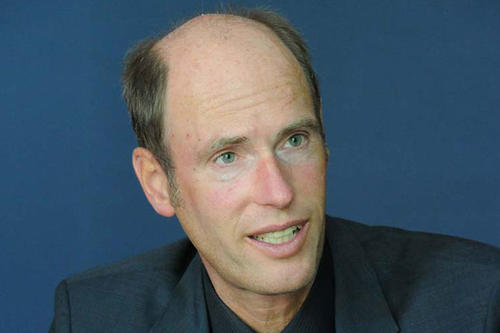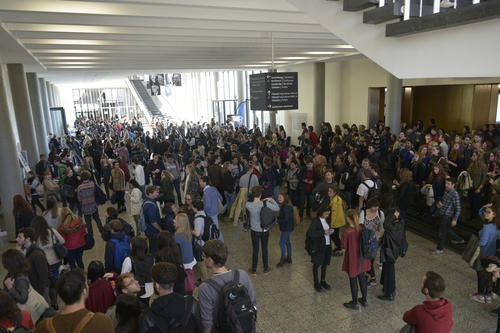"We are happy to accept the challenge."
President Professor Peter-André Alt explains the Welcome to Freie Universität Berlin Program / Information session on October 22 for refugees planning to study at the university
Oct 19, 2015
Professor Peter-André Alt: “With the Welcome to Berlin Program, we are attempting to provide assistance with the means at our disposal. We are facing an unprecedented situation.”
This fall, all of the newly enrolled students at Freie Universität Berlin were welcomed in an event in the Henry Ford Building. Refugees interested in studying at Freie Universität are invited to attend the first information session on October 22.
Image Credit: Bernd Wannenmacher
German language classes, an English-language course on Berlin and German studies, students functioning as buddies who accompany refugees getting to know the university – these are just several features in the package of academic measures that Freie Universität has put in place for refugees beginning with this winter semester. Campus.leben spoke with the president of the university, Professor Peter-André Alt. about the reasons for this commitment.
Professor Alt, Freie Universität has launched a program called “Welcome to Freie Universität Berlin.” Why is it offering this kind of program?
We feel that we are obligated to do so – both as a higher education institution that also has a social mandate and as university where freedom plays an important role as more than just an academic value. We have already gotten involved in many areas in this regard. For example, for years we have invited scholars and scientists from countries in crisis where they are persecuted, threatened, and restricted in their work to come stay with us and continue their research with a one-year fellowship as part of the Scholars at Risk program.
What does the program involve?
The goal is to help refugees who are planning to embark on a study program or continue a previous program in Germany in the medium term to get their bearings and give them support. There are several components, such as opening up courses, German language classes, and special supplementary services. As the first step, we are working with the departments to select which courses are a good fit for the program. They will mostly be lectures, but other course types are also conceivable.
Another component of the program is expanding something that is already offered, namely the course in Berlin and German Studies. This package of modules, which is aimed at international visiting students who are enrolled at Freie Universität for one or two semesters, is to be adjusted and offered for refugees as well. The objective is to give them insight into Germany’s cultural, historical, social, and political development. Participants will also learn academic working techniques and cultivate intercultural and language skills.
We also plan to expand capacity within the Studienkolleg preparatory program at Freie Universität. The one-year school preparatory program for international applicants who wish to start a study program encompasses full-day instruction five days a week in the subjects in a focus course appropriate to the prospective study program and in German as a foreign language.
One crucial element of the program is the German language classes, which we plan to start right away, this November, with about 70 participants. At the same time, we are also hoping for support from members of the university community, either as conversation partners for those learning the language or, if they are interested, by teaching German to refugees. We will offer various preparatory courses for this, aimed at employees and students, but also at guest auditors of all ages. We plan to expand this initiative to include external volunteers soon. At that point, we hope to generate interest among retired teachers as well.
Who is the target group for the “Welcome to Freie Universität Berlin” program?
We see the program as a way to try to help with the means at our disposal. The current situation we face is a new one. We are happy to tackle the challenge, but all of us have to gain some experience first.
Our goal is to have what we offer be open to as many people as possible. That said, our organizational capacity is limited, of course, so we also say that we are aiming our efforts first toward those refugees who have evident prospects of starting a study program and want to do so. That means those who have fled to Berlin and have formal higher education entrance qualifications, for example, or who can prove that they are qualified to study. We want to make admission to the Welcome to Freie Universität Berlin program possible without cumbersome or complicated testing processes.
How can students and employees contribute to the program?
We are already receiving a lot of inquiries from around the university, from employees and students alike. We are really happy about this. It’s wonderful to see how many people are already getting involved. The plan is to pool these activities together via the website www.fu-berlin.de/en/welcome.
I already mentioned the language classes as one way to get involved. Students in bachelor’s degree programs are already required to complete an internship that prepares them for working life as part of their studies. Students who want to volunteer and do so with an official entity that is involved in providing help to refugees should be able to earn academic credit for this practical experience in the general career preparation (Allgemeine Berufsvorbereitung, ABV) area of their studies. This possibility always depends at least partly on the subject, though, so for example, it isn’t possible for teaching credential programs right now.
Students can also provide individual support to refugees who are interested in studying as part of a specific buddy or mentoring program, helping them to find their way in everyday life at the university, which is foreign to them. Here as well, we can rely on existing structures from our mentoring program for new students.
What will the costs to the university be, and who will be responsible for paying them?
The program is associated with financial outlays, of course. The German classes will come at a cost, and so will expanding the Studienkolleg and the “Berlin and German Studies” program. The Senate has indicated that it will support us here. We are confident that help will be provided without a lot of red tape.
How will the program affect ongoing university operations?
We can’t assess that yet, since we don’t yet have any concrete figures as regards demand. I am confident that all of the status groups represented at our university want to help and will understand if there is an impact on them. Right now, the biggest burden is being felt by employees who work in administration and academic advising and as initial points of contact and who are making additional efforts. I expressed my thanks for this last Wednesday at the meeting of the Academic Senate. After all, these people are going above and beyond their normal jobs, and that doesn’t go without saying, so I think it is very impressive.
Are there plans for further offerings?
We need to assess demand and evaluate the experiences with our program first. For next semester, we plan to allow those who are completing the Welcome to Freie Universität Berlin program to earn official credits, too, and then have those credits be eligible for later studies. By then, we plan to have resolved the last few legal issues as well.
How do you feel as you look ahead to the next few months?
I firmly believe that we will overcome this challenge. We want to help those who have fled to Germany to be integrated and live together with them as part of the community.
The interview was conducted by Christa Beckmann and Christine Boldt.
Further Information
Freie Universität Berlin is holding special information sessions for prospective students with a refugee background. The first such information session will be held on
Thursday, October 22, 2015, 10 a.m.,
Freie Universität Berlin, Henry Ford Building, Lecture Hall A,
Gary Str. 35, 14195 Berlin.
More information on the subject will be available soon the the website of Freie Universität Berlin.
Location / Map: www.fu-berlin.de/en/redaktion/orientierung/hf


